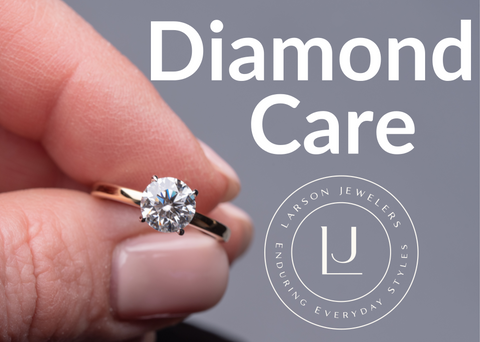TODAY ONLY: FREE OVERNIGHT SHIPPING - Orders over $200
About Diamond Care
1. Regular Cleaning:
- Why It Matters: Diamonds can attract oils, lotions, and everyday dirt, which can dull their sparkle over time. Regular cleaning keeps your diamond looking its best.
-
How to Clean:
- Mix warm water with a few drops of mild dish soap.
- Soak your diamond jewelry for about 20-30 minutes.
- Gently scrub with a soft-bristle toothbrush, paying special attention to the setting where grime can accumulate.
- Rinse thoroughly with clean water and dry with a lint-free cloth.
- Professional Cleaning: For a deep clean, consider having your diamond professionally cleaned once or twice a year. Jewelers have ultrasonic cleaners that can remove stubborn residues.
2. Safe Storage:
- Individual Storage: Store your diamond jewelry separately to avoid scratching other pieces. Use a soft-lined jewelry box or individual pouches to keep them safe.
- Avoiding Chemicals: Diamonds are tough, but harsh chemicals can damage the metal settings or diminish the diamond’s luster. Keep your jewelry away from bleach, chlorine, and other cleaning agents.
3. Regular Inspections:
- Why It Matters: Over time, the prongs or settings holding your diamond may become loose, increasing the risk of losing the stone.
-
How to Inspect:
- Regularly check for any visible signs of wear, such as loose prongs or bent metal.
- If you notice any issues, take your jewelry to a professional jeweler for inspection and repair.
4. Protecting from Physical Damage:
- Remove During Activities: To prevent accidental damage, remove your diamond jewelry before engaging in activities that could expose it to harsh impacts, such as gardening, sports, or heavy lifting.
- Avoid Heat and Pressure: Although diamonds are durable, extreme heat or pressure can cause damage, especially to the setting. Keep your diamonds away from high-heat sources and avoid wearing them in situations where they might be subjected to significant pressure.
5. Preserve the Shine:
- Polishing: Over time, even the hardest surfaces can show signs of wear. Professional polishing can restore the original shine and remove minor scratches from the metal setting.
- Avoid Frequent Touching: The natural oils from your skin can transfer to the diamond, diminishing its brilliance. Try to handle your diamond jewelry by the edges rather than directly touching the stone.
6. Insurance and Protection:
- Why Insure? Whether lab-grown or natural, your diamond is valuable. Ensure it is properly insured to protect against loss, theft, or damage.
- Appraisals: Have your diamond jewelry appraised periodically to ensure that your insurance coverage reflects its current value.
7. Lab-Grown Specific Considerations:
- Heat Treatments: While both lab-grown and natural diamonds can undergo treatments to enhance color or clarity, lab-grown diamonds may be more susceptible to certain types of heat treatments. Always inform your jeweler if your diamond is lab-grown when seeking repairs or modifications.


